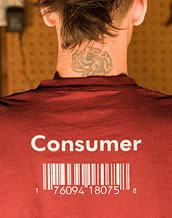· How and why we consume and how our beliefs, ideas and senses influence consumption.
Peter Drucker, the management consultant, famously argued that about 80% of all products and services fail or fall well short of targets within six months of launching. Clearly markets have little understanding of what consumers want — perhaps because people have little clue themselves.
Although you, like me, may find it distasteful to be referred to as a ‘consumer’, with its robotic, slack-jawed connotation, in an age when money has unfortunately become the ultimate measure, there is a certain fascination in the psychology of consumption.
Collected below are recent articles on this subject:
· Beliefs influence taste. Meat means social power and, for some, it’s the power that really tastes good. How our perception of taste is affected by values.
· Smell of money. Smells can subtly affect our behaviour. Find out which smells make customers spend.
· Under the influence. Continuing the restaurants theme, find out how expectations about wine affect how much we eat.
· Can’t talk? Drink. Why loud music in bars increases alcohol consumption.
· Consuming ideas. Not only do we consume things, we also consume ideas. Read on about conceptual consumption.
· Too much choice. Psychologist Barry Schwartz gives a TED presentation explaining why too much choice is bad for us.
· Mysterious stockings. In one experiment people didn’t have a clue why they preferred one identical pair of stockings over another. Find out what we don’t know about shopping.
· Sex sells? Does sex really help sell products, or is it just one of those expressions ad execs use so they can wile away an afternoon choosing models? Find out whether sex sells.
· Experiences or possessions? Which types of purchases make us most happy?
· Why buying stuff can be depressing. Six psychological reasons consumer culture is unsatisfying.
· The ecological consumer. Buying green is about being seen.
· Fattening up the children. Ads for unhealthy foods increase children’s consumption 45%.
· The effect of fake goods. Why inauthentic goods lead to inauthentic behaviour.

